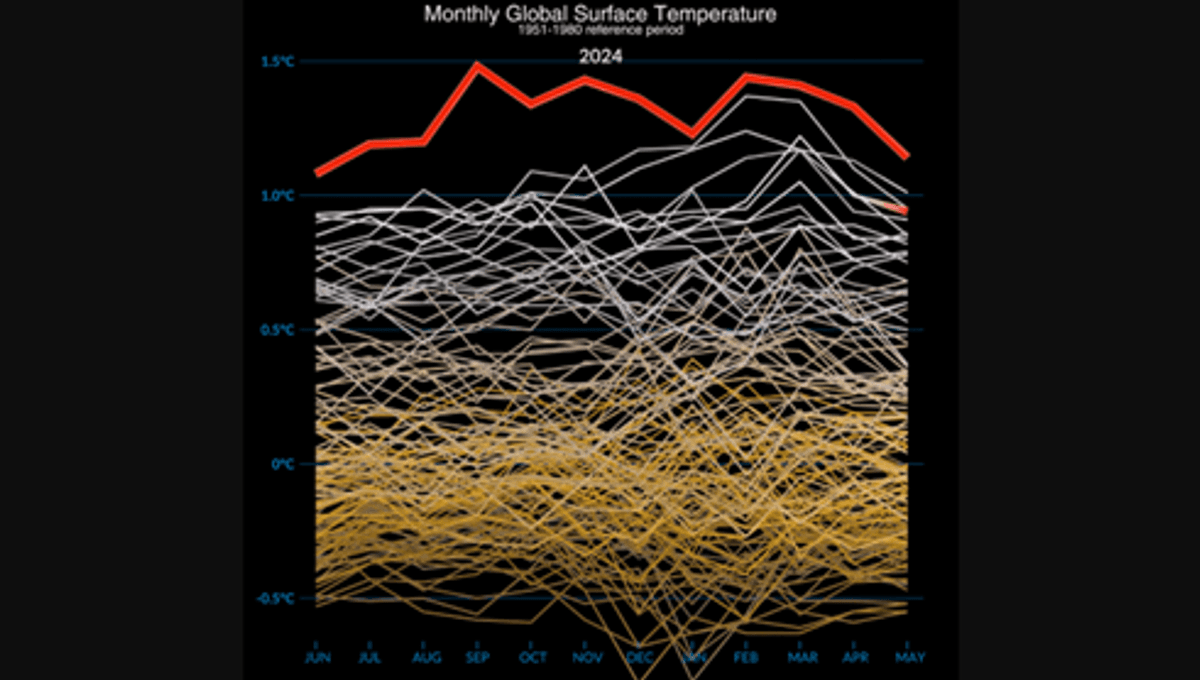
NASA has confirmed a grim, albeit expected, milestone with the release of global average temperatures for last month. The year 2024 has set a new record for the hottest May since global record-keeping began, just like April, March and every month back to June 2023. The last time a month didn’t set a global record was May 2023.
The world is getting hotter fast, but that does not mean every month, or even year, exceeds the previous one. Global average temperatures are higher in the northern hemisphere’s summer, because land temperatures fluctuate more than ocean. Cycles like El Niño/La Niña can cause sharp accelerations or lead to brief temporary cooling.
In the second half of last year, the upward trend caused by the build-up of heat trapping gases coincided with an El Niño to create the hottest northern hemisphere summer for 2,000 years. October-December wasn’t as hot in absolute terms, but each month broke the record for that specific month.
However, the 2023-24 El Niño is fading. Debate continues as to whether it will transition swiftly to La Niña, or if we will have a neutral state for the rest of the year. In the meantime, however, this should bring a halt to the unbroken run of records – but apparently not yet.
Since observation records began, the longest unbroken streak of records (not counting the first year when everything was a record of sorts) was in 2015-2016 when seven straight months were each the hottest of that month measured until then.
“It’s clear we are facing a climate crisis,” said NASA Administrator Bill Nelson in a statement. “Communities across America—like Arizona, California, Nevada—and communities across the globe are feeling first-hand extreme heat in unprecedented numbers. NASA and the Biden-Harris Administration recognize the urgency of protecting our home planet. We are providing critical climate data to better lives and livelihoods, and benefit all humanity.”
NASA measures monthly temperatures relative to the average from 1951-1980. Over the course of the last 12 months temperatures have averaged 1.3° C (2.34° F) above that baseline. This means marginally exceeding the 1.5° C (2.7° F) gap to estimated 19th century temperatures the Paris Agreement stated the world should stay below.
Dr Gavin Schmidt, Director of the Goddard Institute of Space Studies, indicated that the run of records is not expected to continue all year, particularly if La Niña kicks in. Consequently, it remains to be seen whether 2024 will be hotter than 2023, but barring an epic volcanic eruption it will easily exceed every previous year since records began.
“We’re experiencing more hot days, more hot months, more hot years,” said Dr Kate Calvin, NASA’s chief scientist and senior climate advisor. “We know that these increases in temperature are driven by our greenhouse gas emissions and are impacting people and ecosystems around the world.”
Source Link: Every Month For The Last Year Has Been The Hottest Ever Recorded